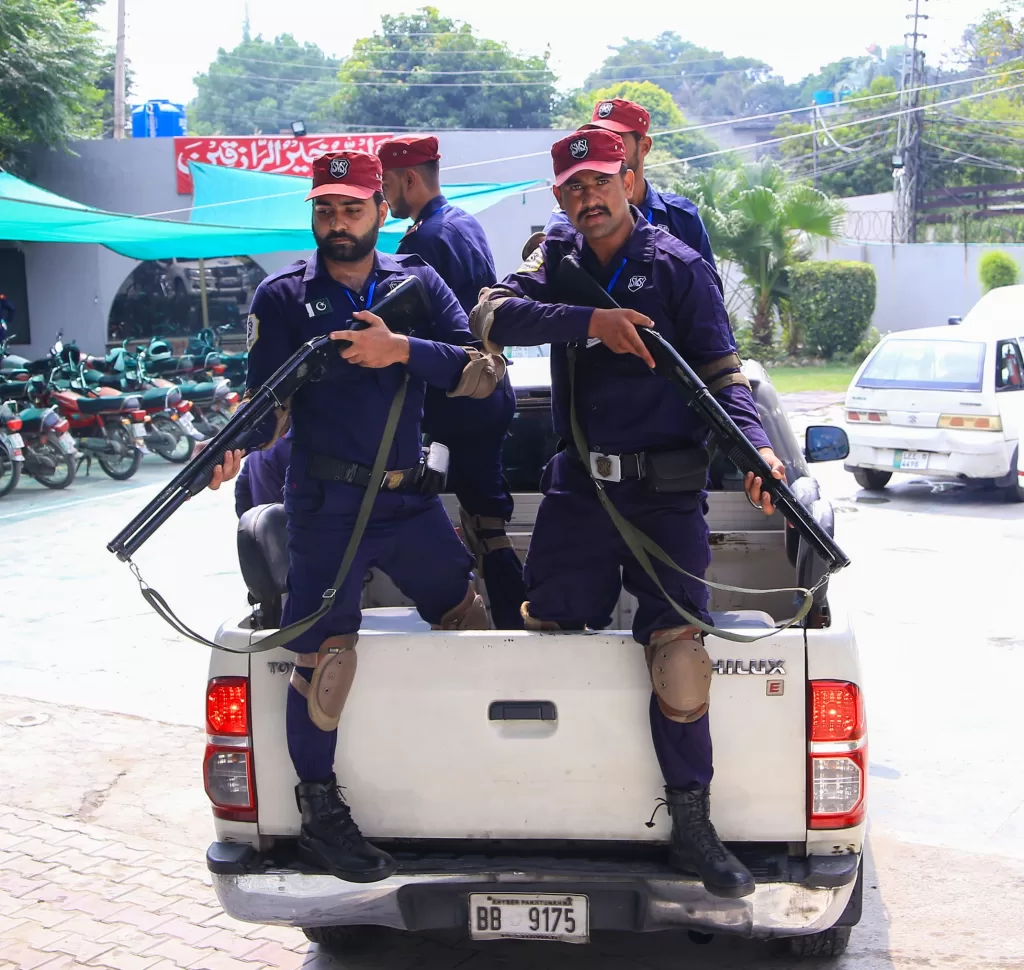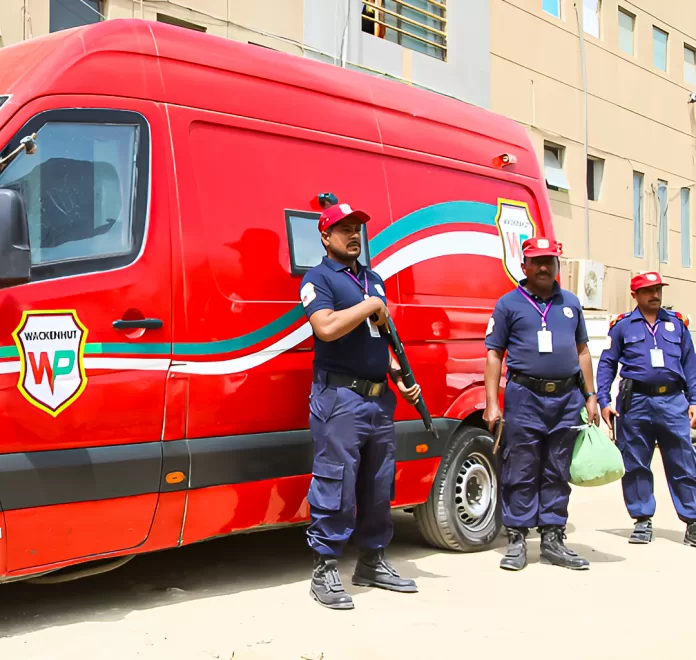A decade or so ago a joint venture foreign (JV) security company was using non-armoured vehicles (known as “soft” vehicles) to transport cash alongwith their armoured vans. Cash cannot be transported in quantity except in armoured vehicles, it is against the law but it costs 4-5 times more to operate an armoured vehicle over a soft vehicle. Over a period of several years more than 50 of their guards were killed and many more injured in various incidents when dacoits attacked their non-armoured vehicles and sprayed them with automatic fire. Ultimately when a girl bystander was killed in the crossfire between the company guards and dacoits in a busy street in Lahore, the Lahore High Court (LHC) took serious notice and ordered compensation.
Because of the judicial notice, the media got hold of it. Because the company being US-owned they feared claims in excess of hundreds of millions US dollars in the US. They pulled out of Pakistan almost overnight. While some compensation was paid to the guards, it was a pittance, if the kins of the workers had been properly advised of their legal rights they would have got much more. The Pakistani partners in the JV started using a new name and continued the murderous practice of using non-armoured (soft) vehicles for cash transportation. Ultimately both the Federal Ministry of Interior (MOI) and the State Bank of Pakistan (SBP) took belated notice and this practice was stopped.
What about due compensation to the kith and kin of those who were killed over the years because of the criminal callousness of the owners in using soft vehicles to get huge profits? The owners should have been indicted for criminal negligence amounting to murder but they got away with it because of their connections, they still do not respect the rights mandated to the guards according to the laws of the land. One example of a continuing aberration, the guards of the company have service contracts on temporary basis so as to avoid legal continuity of service, payment of gratuity, bonuses and other benefits, etc, they are again re-hired every year. Even executives are confirmed after three years. This insidious practice has been going on for years.
Like anyplace else in the world, corporate entities in Pakistan do ensure compliance with mandated labour laws, obviously this adds to the direct costs. Employee rights are generally divided into two categories: statutory and non statutory. Statutory schemes are required by law to be provided to the employees while non-statutory schemes varying from organization to organization. That mandated by law for employees include health benefits, insurance cover, payment of EOBI and Social Security, gratuity on termination, annual bonuses, subsidized quality meals and accommodation where necessary etc. Some corporate owners and their executives question the return on this “investment” because it cuts into profits. Except in major corporate circles (and some businessman/industrialists with a conscience), anything to the employees more than direct wages is not really encouraged in Pakistan.
While the security companies are blamed for this, the blame cannot be wholly attributed to them. Unhealthy practices are practiced in the security services industry (and other sectors of industry as well) because of those who avail their services have no value for human life and insist on lower costs. To be competitive the private security companies have to resort to massive undercutting, this cutthroat business result in key areas of deficiencies. Both employers and employees have to cope with the ever increasing prices of basic commodities, increase in prices of petrol/ gas/power, increasing transportation charges and the fast shrinking purchasing power of the Rupee. Only a week ago the govt raised electricity, gas and POL rates.
While the menace of terrorism has become a scourge for the entire country, private security guards on duty at banks and financial institutions, diplomatic buildings, multinationals (MNCs), etc face extraordinary risk. Besides armed robbery, cases of suicide bombings at bank branches have placed lives of these guards at a much higher risk. However even with inadequate pay and perquisites the poor guard faces the dangers, to feed his family he cannot remain unemployed.

While most corporate entities do show responsibility when they outsource non-core business to vendors, some do not care whether the vendors obey the laws of the land with respect to the obligations towards their employees. A man is prepared to give his life because the job mandates him to do so, and yet he is not given the basic compensation or benefits that an average employee is paid at the organization where he is outsourced to work. It is the responsibility of the companies that outsource ensure that these vendor companies are not resorting to white slavery by not complying with the laws of the land. Monitoring for due diligence and verification of rules and regulations can be carried out by credible chartered accountants duly registered with the State Bank of Pakistan (SBP).
To the credit of the Pakistan Banking Association (PBA) they are in discussion with the All Pakistan Security Agencies Association (APSAA) to ensure a common benchmark for the banking industry for strict compliance, viz (1) Adequate compensation package of guards (2) Life Insurance cover and prompt payment thereof (3) Subsidized quality meals for those provided accommodation or when on duty (4) 24/7 medical service by qualified doctors (5) EOBI and Social Security coverage for the guards, his family and children (6) Paid Annual, Casual and Medical leave (7) Contributory Provident Fund/Gratuity benefit; Additionally, (i) Welfare Fund for grant of returnable and non-returnable loans (ii) Letter of Appreciation/Performance Certificate (iii) Promotion and increment-oriented Annual Performance Evaluation; (iv) Guards to have some mechanism whereby holidays which he necessarily spends away from his family because of the nature of his duty, or gets compensated adequately thereof.
While owners of private security companies are on a fail-safe line to lower the cost to compete and forced to give lesser salaries to the guards, responsible corporations and organizations mandate otherwise, particularly diplomatic entities and multinationals (MNCs). They ask minimum salaries to the guard to base the quotations on legitimate costs. The quote is thus not evaluated on price alone but I combination with technical benchmarks like management and organization skills requiring efficiency and effectiveness.
The laws for private security business are comprehensive, they are to be enforced by the MOI and the Financial Home Departments. The guards offer protection to the clients with their lives on behalf of the security companies, but who protects the interests of the guards? Where is the credible mechanism to ensure laws that must protect the poor guards who are ready to lay down their lives providing protection at the cost of their lives? Everyone seems to look the other way at this “white slavery”. The easy thing to do is to blame the private security companies, what can they do in the face of stiff competition that makes it mandatory to offer low prices to their clients at the cost of the rights and benefits of the private security guards?
Who is going to protect the guards?




